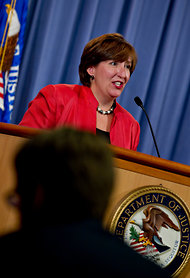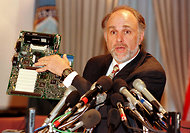Not much has come out on the case since then, leading some participants in the market to wonder whether this is yet another matter the Justice Department has let slide. A Justice Department spokesman said its investigation was continuing.
Thankfully, though, we may yet learn what actually went on behind the scenes in this trillion-dollar market. Investigators for European regulators are hot on the trail and a handful of pension funds have recently filed two suits against the big banks dominating the swaps arena. These investors contend that they overpaid when they bought and sold the instruments — to the tune of billions each year — because of the banks’ control of the market.
On July 1, the antitrust division of the European Commission announced that its investigators had come to a “preliminary conclusion” that the banks and two entities controlled by them had infringed European antitrust rules. These entities colluded, the commission said, “to prevent exchanges from entering the credit derivatives business between 2006 and 2009.”
Credit default swaps were at the center of the financial crisis. These instruments allow holders of bonds or other debt to hedge their risks in those positions. But the swaps also let speculators bet on a debt issuer’s default. The swaps almost felled the American International Group, the insurance giant, and were embedded in some of the stinkiest mortgage securities ever wrought.
But the market for these swaps has been conducted in the shadows. Trades were made over-the-counter — between private parties and not on an exchange. This meant that participants’ positions were not disclosed to regulators.
Wall Street likes the fog of over-the-counter markets because the profits generated by executing customers’ trades in them are far greater than in more transparent arenas. Think of the way you might shop for a mortgage: if mortgage rates were not publicly available, it would be hard to know whether the rate one banker offered was competitive. Customers that dealt with only one banker on their credit default swaps almost certainly did not get the best prices.
The 13 banks under the microscope on credit default swaps include Bank of America Merrill Lynch, Goldman Sachs, JPMorgan Chase, Morgan Stanley and UBS. Two associated entities controlled by the big banks are also being scrutinized — the International Swaps and Derivatives Association, a lobbying organization, and Markit, a data service provider.
A spokeswoman for the European Commission declined to comment beyond the July 1 announcement of its preliminary conclusions. Now the banks can make their arguments to the commission. If the officials are not persuaded and find enough evidence of antitrust infringements by any of the entities, the commission said, it can impose a fine of up to 10 percent of a bank’s revenue.
The commission began its investigation in April 2011, two years after the Justice Department’s. The European inquiry focused on activities from 2006 to 2009 when two exchanges, the Deutsche Börse and the Chicago Mercantile Exchange, were trying to enter the credit derivatives business.
Both exchanges sought licenses and data from I.S.D.A. and Markit to begin trading futures contracts based on credit default swaps, the commission said. But it said that the banks that control both entities refused to provide licenses for exchange trading, and that several banks tried to shut out the exchanges by choosing another clearing house for trades, ICE Clear Europe, which they owned.
These activities may have delayed the development of exchange trading in these derivatives, the commission said. Investors’ costs are much higher in over-the-counter markets where spreads are wide between the prices they must pay to buy and sell. Trading on an exchange narrows those spreads. According to a 2012 study by Deloitte, for example, spreads between bids and offers on dividend swaps declined by 75 percent after they began trading on the Eurex exchange in 2008.
“There was no question the banks did not want the C.M.E. to make the market more liquid and transparent,” said one person briefed on the banks’ internal discussions who asked for anonymity because he was not authorized to speak publicly. “This was their cash cow, and they didn’t want to give it up.”
None of the banks would comment on either Europe’s investigation or on the recent lawsuits. Steven Kennedy, a spokesman for I.S.D.A., said it was cooperating with the commission. “I.S.D.A. is confident that it has acted properly at all times and has not infringed E.U. competition rules,” he added. He also said the allegations in the lawsuits were meritless.
A spokesman for the Markit Group did not return a phone call seeking comment.
The banks have pushed to keep the market for credit default swaps in the dark. Three years ago, the Dodd-Frank legislation aimed to bring more competition by pushing trading onto exchanges and swap execution facilities. Wall Street tried to beat back regulators’ efforts to write tough rules after the legislation’s lead. They won some and they lost some. For instance, dealers now have to report swap transactions to regulators.
There was a reason for the banks’ pushback: money. The Deloitte study cited a 2010 analysis by Citigroup showing that the big banks’ trading in over-the-counter derivatives generated revenue of $55 billion, or 37 percent of the total at these institutions. Such profits will fall as more swaps trade on swap execution facilities under the new rules.
THE pension fund of the Sheet Metal Workers Local 33 of Cleveland is among the investors who filed the lawsuits against the banks, I.S.D.A. and Markit.
“The antitrust laws are the Magna Carta of free enterprise,” said Christopher M. Burke, a lawyer at Scott Scott in San Diego who represents the pension fund. “When you have markets that are not competitive, opaque and where market players don’t have access to the same information, the markets are not functioning in a competitive fashion. Those that have the information can take advantage of that fact and extract anticompetitive leverage over those that lack the information.”
Mr. Burke pointed out that a private lawsuit, like the pension fund’s, is one way to shed light on anticompetitive behavior. Another is government action. European antitrust laws, unlike those in the United States, allow authorities to pursue remedies for past behavior. That’s a powerful tool for pulling back the curtain on investor-unfriendly practices.

Article source: http://www.nytimes.com/2013/07/21/business/trying-to-pierce-a-wall-street-fog.html?partner=rss&emc=rss


